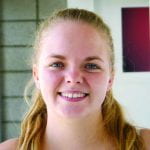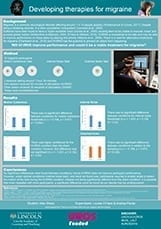By Alex Sharp //
 Taking part in UROS has given me the chance to work towards a therapy for migraine sufferers alongside a practicing academic. For my project, I had the opportunity to investigate whether transcranial electrical stimulation can enhance participant performance on a motion discrimination task, which in the past has been found to be a difficult task for migraine sufferers. If this is the case, then this stimulation may be able to stop the build-up of neural activity in the brain, and hence may be able to stop a migraine attack before it happens.
Taking part in UROS has given me the chance to work towards a therapy for migraine sufferers alongside a practicing academic. For my project, I had the opportunity to investigate whether transcranial electrical stimulation can enhance participant performance on a motion discrimination task, which in the past has been found to be a difficult task for migraine sufferers. If this is the case, then this stimulation may be able to stop the build-up of neural activity in the brain, and hence may be able to stop a migraine attack before it happens.
Over the summer I had the chance to use new equipment and learn new skills that I can take with me post university. The project threw some challenges my way, but I managed to overcome them and complete the project successfully. One challenge was the recruitment of participants as we had a specific group we were looking for and the amount of people around campus was sparse. However, through perseverance I was able to recruit the desired number of participants.
Another challenge was arranging sessions around different participant’s availability as the study required two sessions on different days. I managed to overcome this by staying organised and making a calendar and suggesting specific time slots for them to choose from to avoid confusion. I originally aimed to complete the testing within one month, however, with these challenges I soon realised this was overly optimistic and this ended up lasting two months.
A further challenge I found was using the equipment as it could be temperamental since migraine is more common in females, who often have longer hair and since hair is not a good conductor, connecting the electrodes with longer hair could be tricky. However, as the project progressed I found it easier to connect them, learning all the tricks to get it working first time.
This experience has taught me many things about myself, including my ability to work with others as a team, communicate complex information to others, and to adapt to different situations to make sure I overcome any challenges thrown my way.
I enjoyed having the chance to ask any questions I had and to learn from an expert in that field. I believe I can take this knowledge with me in the future into my third year, and hopefully into postgraduate study and beyond. I have learnt many more research skills in addition to the core skills incorporated into the course and have made some staff contacts which I believe will be valuable in the future.
I would like to thank Louise O’Hare for giving me this opportunity as well as Andrea Pavan and Filippo Ghin for your help and support with the project.
*To view Alex’s project poster, please click on the thumbnail below:
